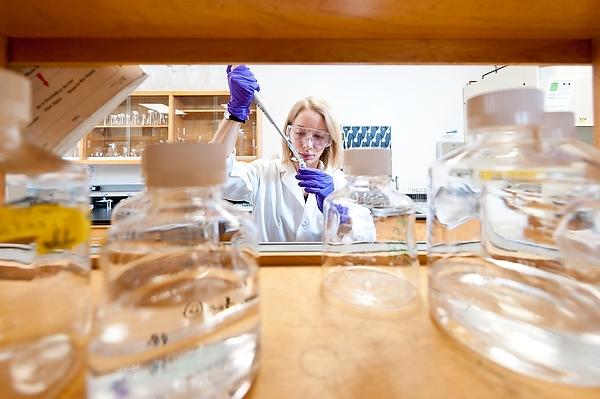When University of Wisconsin assistant professor of neuroscience Darcie Moore was in college, she did not know much about science. In fact, she was majoring in opera performance and performed professionally.
But a desire to use her skills to help people pushed her to take more science classes and switch her major to music theory. Her professors noticed her talent and encouraged her to pursue it, bringing her to where she is now.
Meanwhile, an instructor once discouraged UW assistant professor of mathematics Steven Sam from pursuing his interest in mathematics. But Sam followed his dreams and eventually earned a Ph.D. in the field. He said he had always been good at math and could not leave it behind.
Going against all odds, Moore and Sam worked toward their dreams and have seen their work pay off. Along with 126 other young researchers across the U.S. and Canada, the two were awarded the prestigious Sloan Fellowship for outstanding potential in their area of expertise.
Switching to science was challenging for Moore because she had to catch up. Moore said she loved the way science made her think and how it challenged her with the puzzles it presents.
“You don’t have to come from a science background but you can still work hard, be creative and disciplined and make things happen,” Moore said.
Sam, who was one of 20 mathematicians awarded fellowships, studies algebraic structures as they appear in mathematics and related areas. Algebraic structures are a more abstract form of math and include concepts like vectors.
“I took various kinds of courses as an undergrad and liked math courses most so kept pursuing them,” Sam said. “It is something I really enjoy.”
Sam said he seeks to develop tools to understand why such abstract algebra works.
Each fellowship awards the recipient $60,000 to kick-start their research. The money can be spread out at the discretion of each recipient throughout the two-year fellowship.
Moore was one of 16 neuroscientists who were awarded fellowships. She said she is continuing her postdoctorate research on stem cells. She is also conducting new research to understand if a certain type of cell process is a factor involved in the dysfunction of stem cells as they age.
Research is expensive, Moore said, and the fellowship gave her time to write grants for more funding. It also gave her the recognition she needs to gain future grant funding.
Moore also said she enjoyed the aspect of teaching, which she said is similar to performing on stage. She recognized how her mentors changed her life and wanted to have an opportunity to impact other people’s lives by sharing the knowledge she was learning. Much of what Moore does today draws on her opera days, especially perseverance and determination.
Both Moore and Sam said they decided to do their research at UW because it offered the strongest programs.
Moore said UW is well-known for stem cell research, and research in neuroscience here is highly ranked.
Science is hard and there are many disappointments for every discovery, Moore said. Students have to have a natural curiosity and excitement about learning, a drive to self-educate and a lot of motivation to come up with creative ideas to solve problems in the world.
Sam said students should take their studies seriously and interact with professors since the academic selection process gets tighter and tighter at different levels. He advised taking advantage of opportunities like participating in research projects as well.
“These things will not only enrich your education, they will also prepare you for your future tract,” Sam said.


